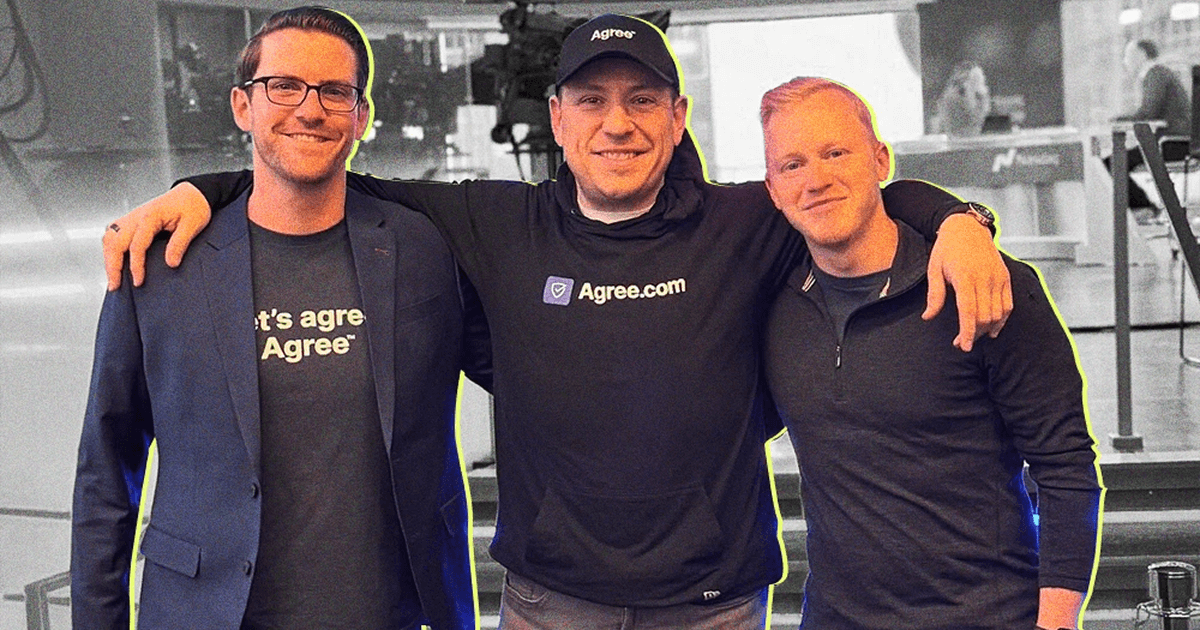
Agree.com raises $7.2 million in seed funding to integrate payments into e-signature processes, challenging industry leaders like DocuSign.
The startup aims to streamline contract-to-cash workflows by embedding payment collection directly into digital signing.
Investors see potential in Agree.com’s approach to making contracts more dynamic and efficient, reflecting industry shifts towards digitization.

The drive to integrate financial services directly into business software is fundamentally altering user expectations and forging new competitive landscapes. For the traditional e-signature market, this signals a pivotal shift: the mere act of signing is no longer the endpoint, as the real opportunity emerges in seamlessly connecting contracts to cash.
One fintech startup spearheading this transformation is Agree.com, which recently announced a $7.2 million seed funding round. The company, led by CEO Marty Ringlein, aims to make payment integration the central pillar of the e-signature experience, directly challenging established giants like DocuSign.
The core problem: For years, businesses have grappled with clunky, separate steps for getting contracts signed and then chasing payments. Agree.com was founded to address this “disjointed and fragmented workflow,” as Ringlein described to TechCrunch, by embedding payment collection directly into the digital signing process.
A disruptive model: Agree.com’s strategy is to commoditize the basic e-signature—offering it for free—and generate revenue through transaction fees on payments processed via its platform, alongside premium features for larger teams. This approach leans into the concept of embedded finance, where financial tools become native components of non-financial software.
Investor conviction: This vision has resonated with investors. “They’re solving a huge pain point for us, our portfolio companies, and just about any business that moves the majority of its revenue through contracts,” said Sheel Mohnot of Better Tomorrow Ventures, an early backer, according to the company’s press release. “We believe that everything is fintech, including e-signature.”
Lead investor Tyler Hogge of Pelion Venture Partners, drawing on his experience at Bill.com, added, “What Divvy did for accounts payable, Agree is doing for accounts receivable. While at Bill.com, I saw firsthand the enormous opportunity ahead for streamlining AR automation.” Pelion recently closed a $365 million fund focused on early-stage B2B SaaS.

AI as an enabler: A lean team of seven at Agree.com is leveraging artificial intelligence and Optical Character Recognition (OCR) to automate contract analysis, field detection, and dynamic invoice generation. “With a team of only seven leveraging the latest AI tools, we’re able to compete head-to-head with DocuSign’s 7,000 employees to deliver a better, faster, and cheaper experience,” Ringlein stated.
Challenging the status quo: The e-signature market, projected to reach nearly $60 billion by 2032, has long been dominated by players like DocuSign, which boasts over a million customers. While DocuSign does offer payment collection features, and competitors like Adobe Sign also provide payment integrations, Agree.com bets that its payment-centric, AI-driven approach offers a more seamless “contract-to-cash” automation, addressing common criticisms of incumbents around disjointed workflows.
The future of contracts: This aligns with broader B2B payment trends toward digitization and efficiency, as highlighted by various industry analyses and the recognized benefits in finance. Even Dropbox Sign approaches automation differently, often triggering signatures after payment. Agree.com aims to transform contracts from static documents into dynamic, monetizable assets, streamlining the entire contract-to-cash process. Ringlein is confident in their trajectory and disruptive potential, asserting, “The next version of DocuSign won’t look anything like DocuSign.”
Agree.com raises $7.2 million in seed funding to integrate payments into e-signature processes, challenging industry leaders like DocuSign.
The startup aims to streamline contract-to-cash workflows by embedding payment collection directly into digital signing.
Investors see potential in Agree.com’s approach to making contracts more dynamic and efficient, reflecting industry shifts towards digitization.

Better Tomorrow Ventures

The drive to integrate financial services directly into business software is fundamentally altering user expectations and forging new competitive landscapes. For the traditional e-signature market, this signals a pivotal shift: the mere act of signing is no longer the endpoint, as the real opportunity emerges in seamlessly connecting contracts to cash.
One fintech startup spearheading this transformation is Agree.com, which recently announced a $7.2 million seed funding round. The company, led by CEO Marty Ringlein, aims to make payment integration the central pillar of the e-signature experience, directly challenging established giants like DocuSign.
The core problem: For years, businesses have grappled with clunky, separate steps for getting contracts signed and then chasing payments. Agree.com was founded to address this “disjointed and fragmented workflow,” as Ringlein described to TechCrunch, by embedding payment collection directly into the digital signing process.
A disruptive model: Agree.com’s strategy is to commoditize the basic e-signature—offering it for free—and generate revenue through transaction fees on payments processed via its platform, alongside premium features for larger teams. This approach leans into the concept of embedded finance, where financial tools become native components of non-financial software.
Investor conviction: This vision has resonated with investors. “They’re solving a huge pain point for us, our portfolio companies, and just about any business that moves the majority of its revenue through contracts,” said Sheel Mohnot of Better Tomorrow Ventures, an early backer, according to the company’s press release. “We believe that everything is fintech, including e-signature.”
Lead investor Tyler Hogge of Pelion Venture Partners, drawing on his experience at Bill.com, added, “What Divvy did for accounts payable, Agree is doing for accounts receivable. While at Bill.com, I saw firsthand the enormous opportunity ahead for streamlining AR automation.” Pelion recently closed a $365 million fund focused on early-stage B2B SaaS.

Agree.com

AI as an enabler: A lean team of seven at Agree.com is leveraging artificial intelligence and Optical Character Recognition (OCR) to automate contract analysis, field detection, and dynamic invoice generation. “With a team of only seven leveraging the latest AI tools, we’re able to compete head-to-head with DocuSign’s 7,000 employees to deliver a better, faster, and cheaper experience,” Ringlein stated.
Challenging the status quo: The e-signature market, projected to reach nearly $60 billion by 2032, has long been dominated by players like DocuSign, which boasts over a million customers. While DocuSign does offer payment collection features, and competitors like Adobe Sign also provide payment integrations, Agree.com bets that its payment-centric, AI-driven approach offers a more seamless “contract-to-cash” automation, addressing common criticisms of incumbents around disjointed workflows.
The future of contracts: This aligns with broader B2B payment trends toward digitization and efficiency, as highlighted by various industry analyses and the recognized benefits in finance. Even Dropbox Sign approaches automation differently, often triggering signatures after payment. Agree.com aims to transform contracts from static documents into dynamic, monetizable assets, streamlining the entire contract-to-cash process. Ringlein is confident in their trajectory and disruptive potential, asserting, “The next version of DocuSign won’t look anything like DocuSign.”
© 2025 Bamboo HR LLC. All Rights Reserved. BambooHR® is a registered trademark of Bamboo HR LLC